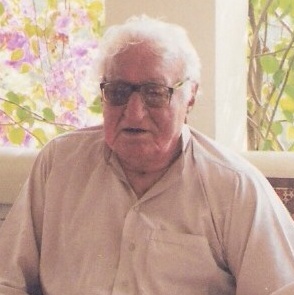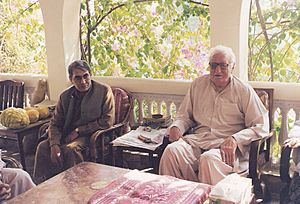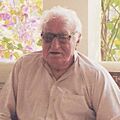Abdul Wali Khan facts for kids
Quick facts for kids
Abdul Wali Khan
عبدالولی خان عبدالولي خان |
|
|---|---|
 |
|
| Leader of the Opposition | |
| In office 2 December 1988 – 6 August 1990 |
|
| Preceded by | Fakhar Imam |
| Succeeded by | Benazir Bhutto |
| In office 14 April 1972 – 17 August 1975 |
|
| Preceded by | Nurul Amin |
| Succeeded by | Sherbaz Khan Mazari |
| Personal details | |
| Born | 11 January 1917 Utmanzai, British India |
| Died | 26 January 2006 (aged 89) Peshawar, North-West Frontier Province, Pakistan |
| Political party | Awami National Party (1986–2006) |
| Other political affiliations |
Khudai Khidmatgar Indian National Congress (Before 1947) National Awami Party (1957–1968) National Awami Party-Wali (1968–1986) |
| Spouse |
Nasim Wali Khan
(m. 1954) |
| Relations | Abdul Ghani Khan (brother) Khan Abdul Jabbar Khan (uncle) Khan Abdul Bahram Khan (Grand father) |
| Children | Sangeen Wali Khan Asfandyar Wali Khan |
| Parents | Abdul Ghaffar Khan Meharqanda Kinankhel |
| Education | Azad Islamia High School |
Khan Abdul Wali Khan (Pashto: خان عبدالولي خان; Urdu: خان عبدالولی خان; 11 January 1917 – 26 January 2006) was an important Pakistani politician. He led the Awami National Party. His father, Abdul Ghaffar Khan, was a famous Pashtun leader. Wali Khan was also an activist and writer who spoke out against the British Raj (British rule in India).
In his younger years, he joined his father's non-violent movement, known as the "Red Shirts." This group resisted British rule. He later became active in the Indian National Congress, a major political party. After Pakistan was formed in 1947, Wali Khan became a well-known figure in Pakistani politics. He was respected for his work in creating Pakistan's third constitution. He also led protests to bring back democracy in the 1960s and 1980s. In the 1970s, he was the leader of the opposition in Pakistan's first elected parliament.
Contents
Early Life and Education
Wali Khan was born on 11 January 1917. His family were local landowners in Utmanzai, a town in what was then British India. His father, Abdul Ghaffar Khan, started the Khudai Khidmatgar (meaning "Volunteer" in Pashto) movement. This group believed in peaceful resistance.
Wali Khan went to the Azad Islamia School in Utmanzai. This school was part of a network created by his father. These schools helped the Khudai Khidmatgar movement grow. The movement challenged British rule in the region using non-violent protests.
In 1933, he went to the Colonel Brown Cambridge School in Dehra Dun. He did not continue his studies further because of eye problems. He wore glasses for the rest of his life. His first wife passed away in 1949 while he was in prison. In 1954, he married Nasim Wali Khan.
Stepping into Politics
In 1942, at age 25, Wali Khan joined the Khudai Khidmatgar movement. Soon after, he officially entered politics by joining the Indian National Congress. He became a joint secretary for the party in his province. In 1943, he was arrested during a major crackdown against the Quit India Movement.
He did not support the division of India in 1947. This division led to the creation of Pakistan. His older brother, Ghani Khan, left politics, which influenced Wali Khan to take a more active role. With his father in jail, Wali Khan began leading his father's supporters.
On 14 August 1947, Pakistan was formed. It was split into two parts, East and West Pakistan. After Pakistan was created, Wali Khan pushed for more self-rule for the Pashtun people within Pakistan. This often put him at odds with the government.
He was put in prison without charges in 1948. When he was released in 1953, he started talking with the government. These talks helped release many Khudai Khidmatgar activists from prison. In 1956, Wali Khan joined the National Awami Party (NAP). His father and other progressive leaders from both parts of Pakistan formed this new party.
The National Awami Party was doing well for the 1959 elections. However, the military took over the government. The new military leader, Ayub Khan, banned political activities. Wali Khan and many other politicians were put in prison. They were also stopped from running in elections.
Politics: 1958–1972
By 1962, Ayub Khan introduced a new constitution. He announced he would run for president again. Opposition parties joined together as the Combined Opposition Party. They chose Fatima Jinnah, the sister of Pakistan's founder, to run against Ayub Khan. Wali Khan supported Fatima Jinnah and helped with her election campaign.
Ayub Khan was re-elected in 1964. There were claims of vote rigging by the government. Also, there were disagreements among the opposition parties. These disagreements led to the National Awami Party splitting in 1967. Wali Khan was elected president of his own group of the party in 1968.
In the same year, people started protesting against Ayub Khan's rule. There was a lot of corruption and rising prices. Wali Khan and other opposition leaders formed the Democratic Action Committee. They wanted to talk with Ayub Khan about bringing back democracy.
Ayub Khan resigned in 1969 under pressure from the military. The new military leader, Yahya Khan, called for elections in 1970. He promised to give power to the party that won the most votes. In these elections, Sheikh Mujibur Rahman's Awami League won most of the seats in East Pakistan. In West Pakistan, Zulfiqar Ali Bhutto's party won many seats. Wali Khan was elected to both the provincial and national assemblies.
However, the military government did not accept the Awami League's victory. This led to a difficult situation. In 1971, Wali Khan and other politicians met Sheikh Mujibur Rahman. They offered support to form a government. But it was too late. Yahya Khan had already decided on a military crackdown. This led to the Bangladesh Liberation War. Pakistan's army was defeated in East Pakistan, and the new country of Bangladesh was created. Yahya Khan resigned, and Zulfikar Ali Bhutto became the new leader.
During the military crackdown, Wali Khan's National Awami Party was one of the few parties that protested. The military government banned the party and arrested many of its members.
Politics: 1972–1990
Working with the Government
In 1972, Zulfiqar Ali Bhutto reached out to Wali Khan. Bhutto wanted to end martial law and create a new constitution. Wali Khan's talks with Bhutto led to an agreement called the Tripartite Agreement. This agreement ended martial law and allowed the National Awami Party to operate again. It also led to the National Awami Party forming governments in the NWFP and Baluchistan provinces. However, the relationship between Khan and Bhutto soon became difficult.
Helping Create the Constitution
On 23 March 1973, a government force attacked an opposition rally in Rawalpindi. Many people were killed or wounded. Wali Khan narrowly escaped being shot. Most of the people killed were Pashtuns and members of the National Awami Party. Despite this, Wali Khan continued to support talks with Bhutto for a new constitution.
He was chosen as the leader of the opposition. He then led talks with Bhutto to pass Pakistan's "unanimous" constitution in August 1973. Wali Khan helped ensure that the NWFP and Baluchistan provinces would receive royalties for their water and gas resources. He also made sure the government would work to improve all regions of Pakistan equally.
During this time, Wali Khan supported Bhutto's efforts to release prisoners of war from the 1971 war. He also supported normalizing relations with India through the Simla Agreement.
Arrest and Trial
In 1974, a close ally of Zulfiqar Ali Bhutto was killed in a bomb blast. Bhutto believed that Abdul Wali Khan and the National Awami Party were responsible. In response, the government banned the National Awami Party. Most of its leaders, including Wali Khan, were arrested and put in prison. They were put on trial in what was known as the Hyderabad tribunal.
Wali Khan refused to take part in the trial, as he felt it was unfair. He even filed a lawsuit against someone for not giving him money that he was supposedly sent by India's Prime Minister. He said he never received the money.
Writing Books
Wali Khan had written a book in Pashto about his father's non-violent movement. In 1986, he published another book called Facts Are Facts. This book used old British documents. Wali Khan claimed that Pakistan's creation was part of a British "divide and rule" plan. He suggested that Muhammad Ali Jinnah (Pakistan's founder) and other leaders acted on behalf of the British.
Awami National Party
In July 1986, Wali Khan and other former National Awami Party members formed the Awami National Party (ANP). Wali Khan became its first president. The ANP joined forces with Benazir Bhutto's Pakistan Peoples' Party for the 1988 elections. However, the ANP only won seats in certain parts of the NWFP. Wali Khan even lost his own provincial seat.
The ANP-PPP alliance ended in 1989 due to disagreements over government positions. Wali Khan then joined an alliance with the Islamic Democratic Alliance before the 1990 elections.
After Retirement from Politics
After losing in the 1990 elections, Wali Khan decided to retire from electoral politics. He said he had no place in politics when other forces were deciding the country's future.
After he retired, Wali Khan spoke less with the media and public. His party, the ANP, focused more on provincial politics. They also worked to rename the NWFP to Pakhtunkhwa.
In 1998, Prime Minister Nawaz Sharif announced plans to build the Kalabagh Dam. Many Pashtun and Sindhi nationalists were against this. They believed it would give too much control over water to the majority Punjabis. Wali Khan led a large protest against the dam. This protest helped convince Sharif to drop the plan.
In 2001, Wali Khan supported the US attack on the Taliban. He said that if the US had not attacked, Afghanistan might have become an "Arab colony." He noted that Osama bin Laden had a large army there.
Wali Khan's last press conference was in 2003. He announced that his friend Ajmal Khattak and other colleagues were returning to the ANP.
Relationships with Other Leaders
Wali Khan had a strong rivalry with Pakistan's Prime Minister, Zulfiqar Ali Bhutto. He often criticized Bhutto, calling him "Adolph Bhutto." In return, Bhutto accused Khan of working with India and Afghanistan to break up Pakistan.
Wali Khan claimed that Bhutto tried to have him killed. He survived four attempts on his life. After one close call, he warned Bhutto in the National Assembly that he would fight back. After that, Bhutto's trips to the NWFP were heavily guarded.
Their debates were often heated. Once, after Bhutto returned from a successful trip, he criticized the opposition. Wali Khan replied, "Mr. Bhutto, you stop telling lies about me and I will stop telling the truth about you."
Wali Khan and his family faced harsh treatment from Bhutto's government. Because of this, Wali Khan showed little sympathy when Bhutto was executed in 1979.
Times in Prison
Wali Khan spent several periods in prison during his 48-year political career. His first arrest was in 1943 by the British for his role in the Khudai Khidmatgar movement. In 1948, the new Pakistani government arrested him again. This was because the Khudai Khidmatgar opposed the creation of Pakistan. He was held in various jails for over five years without charges. During this time, in 1949, his first wife and their second son died. Wali Khan was not allowed to attend her funeral. He was finally released in 1953.
His third time in prison was after General Ayub Khan took power in a military coup. The new government wanted to remove political opponents. Wali Khan and hundreds of other politicians were stopped from participating in politics. He joked about his imprisonment, telling an official that he couldn't have met him earlier because he was in prison for three years. He was briefly arrested again in 1969.
His last time in prison was under Zulfiqar Ali Bhutto's government. Wali Khan found this period the most difficult. His party was banned, and his family and friends faced severe actions. His brother-in-law was forced to leave the country, and his son was tortured. He wrote about this time with bitterness in his book Facts Are Sacred.
This tough experience made Wali Khan sometimes hesitant to criticize military leader Muhammad Zia-ul-Haq. Zia-ul-Haq removed Bhutto from power in 1977 and had him executed in 1979.
Death and Legacy
Abdul Wali Khan passed away from a heart attack on 26 January 2006, in Peshawar, Pakistan. He was buried in his family village in Uthmanzai. Many people attended his funeral, including important political leaders. Messages of sympathy came from the Pakistani President, Indian Prime Minister, and Afghan President. He is survived by his wife, three daughters, and two sons. His eldest son, Asfandyar Wali Khan, continues the family's political tradition as the current president of the Awami National Party.
Some people criticize Wali Khan, saying he did not do enough to fix Pakistan's political system. They question his claim that he was the main voice for Pashtuns. They also disagree with his choice not to compromise with dictators. Others believe that if he had compromised with the military, he might have become Prime Minister. But his strong principles stopped him.
Some Pashtun nationalists also criticized Wali Khan. They felt he missed a chance to unite all Pashtuns into one large province. Khan also faced criticism for supporting Urdu as the official language in NWFP and Baluchistan, instead of Pashto and Balochi.
Wali Khan spent most of his life dealing with the legacy of his famous father and the idea that he was "anti-Pakistani." He was accused of supporting ideas that would break up Pakistan and causing social unrest. State media often called him a traitor. However, some writers disagree with these accusations. They say the conflict was more about different political ideas.
His supporters believe he promoted progressive and secular politics in Pakistan. Before his arrest in 1975, he was trying to play a bigger role in national politics. He was gaining support in other provinces like Punjab and Sind.
Wali Khan sometimes left his policies open to interpretation. In 1972, when asked about his loyalty, he said, "I have been a Pashtun for six thousand years, a Muslim for thirteen hundred years, and a Pakistani for twenty-five." But before the 1990 elections, he also said, "Everyone considers themselves a Sindhi or Pashtun or Punjabi first. Nobody considers themselves a Pakistani. There has to be greater provincial autonomy."
He worked well with many politicians from Punjab and Balochistan. He was also accused of being a communist or a secular Pashtun nationalist. His disagreement with Baloch leader Ghous Bizenjo in the late 1970s was partly due to his growing dislike for Communism.
Wali Khan and his family had a long connection with leaders in the Indian Congress Party because of his father's close ties with Mohandas Gandhi. His preference for talking with India instead of fighting, and his links to India, made some anti-India groups in Punjab see him as anti-Pakistan. His opposition to the Afghan jihad, supported by Pakistan and the US, also hurt his standing among some conservative Pashtuns and Pakistanis. The Abdul Wali Khan University Mardan was named in his honor by the Awami National Party government.
See Also
- Dr. Khan Sahib
- Ajmal Khattak
- Mian Ghulam Jilani
- Abdul Ali Khan
- Pakistan National Alliance
- List of political parties in Pakistan
- Mir Gul Khan Naseer
- Mir Ghaus Baksh Bizenjo
- Ataullah Mengal
- Khan Amirzadah Khan
Images for kids
 | James B. Knighten |
 | Azellia White |
 | Willa Brown |




